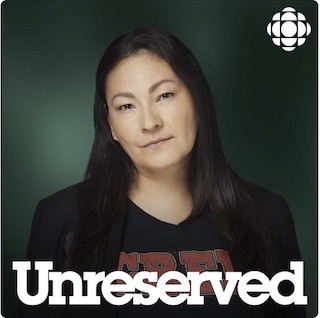
Listen to this interview and learn more on the CBC Canadian radio homepage >>
Indigenous foods matter, and maybe now more than ever, said award-winning chef Sean Sherman, the Oglala Lakota founder of The Sioux Chef.
“It’s a necessity for our future to create access and knowledge and skills around Indigenous foods,” explained Sherman.
Enter Indigenous Food Lab.
Sherman and his team have been working on the concept for Indigenous Food Lab for years. It will launch in Minneapolis in 2020 through their non-profit organization NATIFS (North American Traditional Indigenous Food Systems).
Indigenous Food Lab will be a restaurant, education and training centre. The lab will be a learning hub for everything related to Indigenous food systems — from Indigenous agriculture and seed saving to ethnobotany, cooking techniques and food preservation, explained Sherman.
“Our real goal with Indigenous Food Lab is working with tribal communities, starting in our vicinity and helping them to develop their own Indigenous foods entity for their community. That could be something like a catering operation or a full-scale restaurant if they have the means.”
Eventually, Sherman wants to open Indigenous Food Labs across the United States and beyond. “Every single region and every single city should have food that represents the land that it sits on, to tell that story from the Indigenous perspective,” he said. […]
Food security means there is enough food to eat, explained Sherman, while food sovereignty is about Indigenous control over Indigenous food systems.
This pandemic has exposed vulnerabilities in our food systems, and food insecurity is projected to increase. Currently, across Canada, one in every two First Nations households experience food insecurity, as reported by the First Nations Regional Health Survey.
Because of the ongoing impacts of colonization and the resulting long-term systemic economic and social inequalities, Indigenous communities are disproportionately affected by COVID-19, according to a recent report released by the Yellowhead Institute.
The impacts of the pandemic makes Sherman’s work of revitalizing Indigenous food systems even more pressing, he explained.
The authors of the Yellowhead report, Elisa Levi and Tabitha Robin, echoed Sherman. “Even in a state of emergency, we can design new models and reinvigorate Indigenous food ways, honouring the resiliency and leadership of Indigenous communities like community centred food kitchens, hunter support programs, goose camps, gardens and initiatives like the Indigenous Food and Freedom School,” they wrote.
“As much as we require food security in communities, self-determination may be just as important,” Levi and Robin added. […]
“Having control over our local food systems and not having governments tell us as Indigenous communities what we’re supposed to eat and where we’re supposed to get our food from,” added Sherman.
“We really need control over that,” he said. “Because for us as Indigenous peoples, our cultural and historical food it’s part of who we are. It’s our identity and we need to preserve that.”
Source: Chef calls Indigenous Food Lab ‘a necessity for our future’ 12 June 2020
URL: https://www.cbc.ca/radio/unreserved/chef-calls-indigenous-food-lab-a-necessity-for-our-future-1.5607902
Date visited: 16 June 2020
[Bold typeface added above for emphasis]

“Unreserved is the radio space for Indigenous voices – our cousins, our aunties, our elders, our heroes. Rosanna Deerchild guides us on the path to better understand our shared story. Together, we learn and unlearn, laugh and become gentler in all our relations.” | Listen to more episodes | Related posts >>
The tribal food basket has always been diverse and nutritious, including maize, minor millets like kodo and kutki, oil seeds like ramtila, along with fruits, leaves, rhizomes, mushrooms, meat and fish. […] We have pushed them out of their complementary relationship with ecology, way of life and time-tested nutrition >>